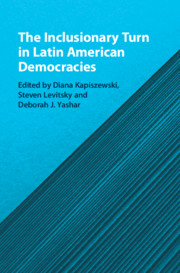Book contents
- The Inclusionary Turn in Latin American Democracies
- The Inclusionary Turn in Latin American Democracies
- Copyright page
- Contents
- Figures
- Tables
- Contributors
- Acknowledgments
- Prologue: Reflections on Two Episodes of Popular Inclusion
- 1 Inequality, Democracy, and the Inclusionary Turn in Latin America
- Part I Extending Social Policy and Participation
- Part II Inclusion and Partisan Representation
- Part III New Party–Society Linkages
- Part IV Inclusion, Populism, and Democracy
- 12 Pathways to Inclusion in Latin America
- 13 Inclusionary Turn, Rentier Populism, and Emerging Legacies
- 14 Strong Citizens, Strong Presidents
- 15 Shaping the People
- 16 The Inclusionary Turn and Its Political Limitations
- References
14 - Strong Citizens, Strong Presidents
The Constitutional Architecture of the Inclusionary Turn in Latin America
from Part IV - Inclusion, Populism, and Democracy
Published online by Cambridge University Press: 12 January 2021
- The Inclusionary Turn in Latin American Democracies
- The Inclusionary Turn in Latin American Democracies
- Copyright page
- Contents
- Figures
- Tables
- Contributors
- Acknowledgments
- Prologue: Reflections on Two Episodes of Popular Inclusion
- 1 Inequality, Democracy, and the Inclusionary Turn in Latin America
- Part I Extending Social Policy and Participation
- Part II Inclusion and Partisan Representation
- Part III New Party–Society Linkages
- Part IV Inclusion, Populism, and Democracy
- 12 Pathways to Inclusion in Latin America
- 13 Inclusionary Turn, Rentier Populism, and Emerging Legacies
- 14 Strong Citizens, Strong Presidents
- 15 Shaping the People
- 16 The Inclusionary Turn and Its Political Limitations
- References
Summary
Astute observers of Latin American politics note a widespread shift towards social inclusion at the turn towards the twenty-first century. Is such a shift evident in written constitutions, and if so, how? We leverage historical data on the content of constitutions to explore this question. A preliminary test is whether the Bolivarian republics of Venezuela, Ecuador, and Bolivia – the militant edge of the “inclusionary turn” – represent a shift from their constitutional trajectory. The evidence suggests that in both style and content, the Bolivarian constitutions are novel by historical standards. A second part of the chapter explores, broadly, the patterns of inclusion across the dimensions of recognition, access, and resource distribution. There is, in fact, a strong trend towards the constitutionalization of inclusion within each of these dimensions. We observe the strongest evidence of such in channels of political access, in the form of participation and accountabililty. Finally, we document a counterintuitive element of the inclusionary turn – the persistence of, and even increase in, strong presidential power with respect to lawmaking authority. We advance the possibility that presidential power, for all of its other implications, may be conducive to inclusion. Broadly, processes of political inclusion are well represented in written constitutions.
- Type
- Chapter
- Information
- The Inclusionary Turn in Latin American Democracies , pp. 461 - 490Publisher: Cambridge University PressPrint publication year: 2021



